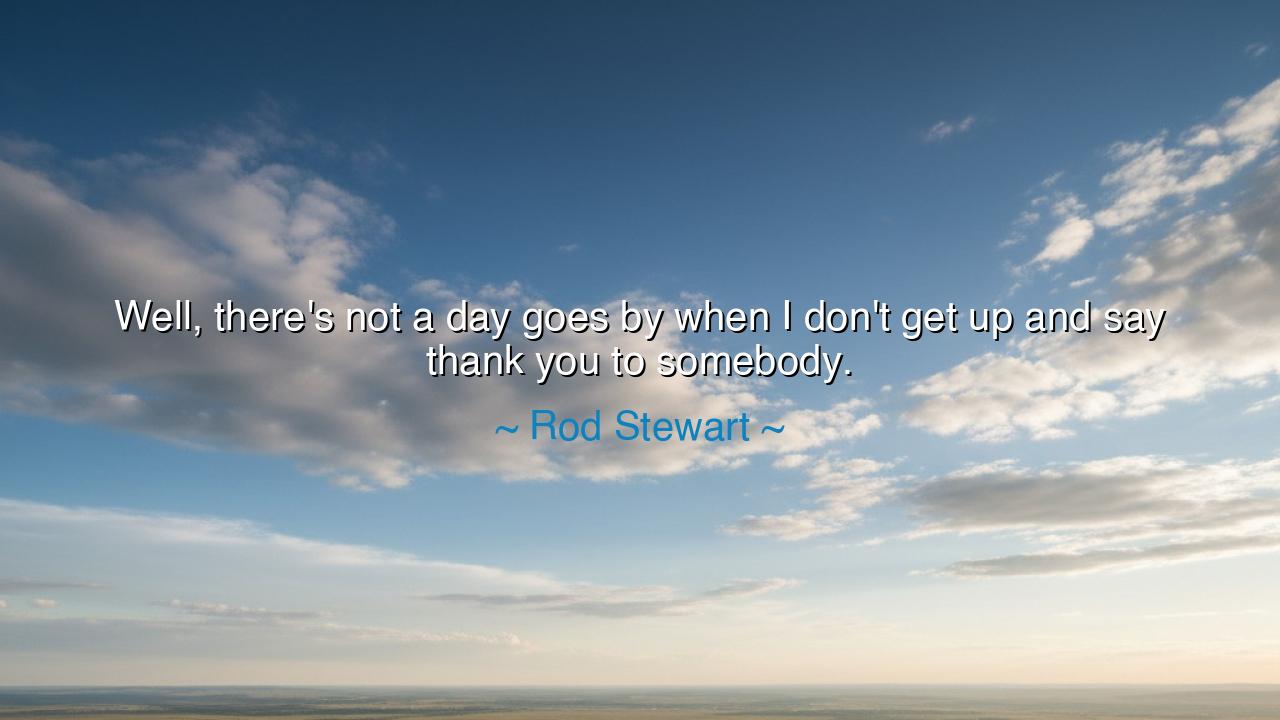
Well, there's not a day goes by when I don't get up and say






Rod Stewart, with the wisdom born of long years and many stages, once declared: “Well, there’s not a day goes by when I don’t get up and say thank you to somebody.” In this simple phrase lies a profound truth that echoes through the ages: that life, in its daily unfolding, is not to be met with entitlement but with gratitude. Stewart, known for his fame and success, points us not to the glitter of applause but to the humble practice of thanksgiving. His words remind us that every morning brings not merely another routine, but another opportunity to lift one’s heart in thanks.
The phrase begins with “not a day goes by”—an acknowledgment of consistency. Gratitude is not occasional, not reserved for holidays or moments of triumph, but a daily rhythm, a spiritual discipline. Just as the sun rises each morning without fail, so should the soul rise in thanksgiving. For if we breathe, if we live, if we wake to another dawn, there is already cause to say thank you. Stewart’s testimony is less about celebrity and more about the eternal truth that each day is a gift unearned.
Notice too his words: “I get up and say thank you to somebody.” Gratitude here is not abstract but directed. It may be to God, who grants life; to family, who stand beside us; to friends, who steady our steps; or even to strangers, who unknowingly brighten our paths. To “say thank you to somebody” is to recognize that life is woven from the labors, kindnesses, and sacrifices of others. No man stands alone, and no success is forged without unseen hands. Gratitude spoken aloud acknowledges the community of blessing in which we live.
History offers us radiant examples of this truth. Consider Abraham Lincoln, who, in the midst of civil war, proclaimed a national day of thanksgiving. Though the land was torn and bloodied, he saw that blessings still abounded—food in the fields, strength in the people, hope for a better union. By calling a nation to daily gratitude, he bound wounds with thanksgiving. Lincoln, like Stewart, understood that no day must pass without a word of thanks, for gratitude is the anchor of the soul in storm as well as in calm.
Even in smaller lives, this wisdom shines. Think of the grandmother who wakes before the household, whispering her thanks as she prepares the day’s bread. She may never receive fame or accolades, yet her constant thanksgiving sanctifies her labor and blesses all who eat from her table. Such lives are the quiet proof that gratitude does not belong only to the great—it belongs to every soul who dares to see the sacred in the ordinary.
The lesson for us is clear: if each day we rise without thanksgiving, we live as if gifts were rights and blessings mere accidents. But if we pause, even for a moment, to say thank you, we transform the ordinary into holy ground. Gratitude keeps the heart soft, the spirit humble, and the eyes open to beauty. Without it, we grow bitter and blind; with it, we grow noble and alive.
Practically, we may follow Stewart’s example. Upon waking, name aloud one person or one gift you are thankful for. Send a message of appreciation to a friend, a family member, or even a colleague. Let your days not pass into silence but be marked by spoken thanksgiving. In time, you will find that gratitude multiplies: the more thanks you give, the more blessings you see.
Thus, Rod Stewart’s words, though spoken in simplicity, echo with the depth of the ancients: there must not be a day without a thank you. For in gratitude lies the secret to joy, the strength for trials, and the nobility of the soul. Let us then rise each morning with thanks upon our lips, and in doing so, we will live not only longer days, but fuller ones.






AAdministratorAdministrator
Welcome, honored guests. Please leave a comment, we will respond soon